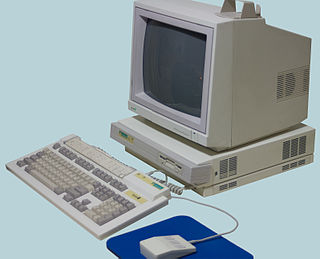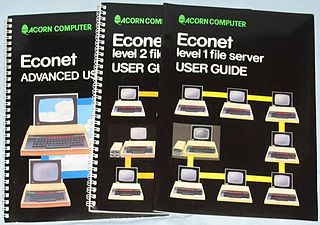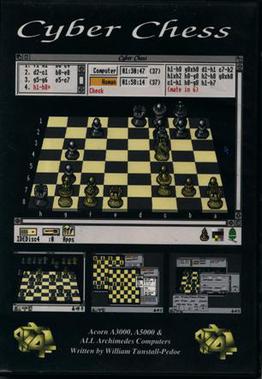
BBC BASIC is a version of the BASIC programming language released in 1981 as the native programming language for the BBC Micro home/personal computer, providing a standardized language for a UK computer literacy project of the BBC. It was written mainly by Sophie Wilson.

Acorn Computers Ltd. was a British computer company established in Cambridge, England, in 1978. The company produced a number of computers which were especially popular in the UK, including the Acorn Electron and the Acorn Archimedes. Acorn's BBC Micro computer dominated the UK educational computer market during the 1980s.

The Risc PC is Acorn Computers's RISC OS/Acorn RISC Machine computer, launched on 15 April 1994, which superseded the Acorn Archimedes. The Acorn PC card and software allows PC compatible software to be run.

Acorn Archimedes is a family of personal computers designed by Acorn Computers of Cambridge, England. The systems are based on Acorn's own ARM architecture processors and the proprietary operating systems Arthur and RISC OS. The first models were introduced in 1987, and systems in the Archimedes family were sold until the mid-1990s.

RISC OS is a computer operating system originally designed by Acorn Computers Ltd in Cambridge, England. First released in 1987, it was designed to run on the ARM chipset, which Acorn had designed concurrently for use in its new line of Archimedes personal computers. RISC OS takes its name from the reduced instruction set computer (RISC) architecture it supports.
ARX was an unreleased Mach-like operating system written in Modula-2+ developed by Acorn Computers Ltd in the Acorn Research Centre (ARC) United Kingdom (UK) and later by Olivetti - which purchased Acorn - for Acorn's new Archimedes personal computers based on the ARM architecture reduced instruction set computer (RISC) central processing unit (CPUs).

RISC iX is a discontinued Unix operating system designed to run on a series of workstations based on the Acorn Archimedes microcomputer. Heavily based on 4.3BSD, it was initially completed in 1988, a year after Arthur but before RISC OS. It was introduced in the ARM2-based R140 workstation in 1989, followed up by the ARM3-based R200-series workstations in 1990.

Econet was Acorn Computers's low-cost local area network system, intended for use by schools and small businesses. It was widely used in those areas, and was supported by a large number of different computer and server systems produced both by Acorn and by other companies.
Timeworks Publisher was a desktop publishing (DTP) program produced by GST Software in the United Kingdom.
Xara is an international software company founded in 1981, with an HQ in Berlin and development office in Hemel Hempstead, UK. It has developed software for a variety of computer platforms, in chronological order: the Acorn Atom, BBC Micro, Z88, Atari ST, Acorn Archimedes, Microsoft Windows, Linux, and more recently web browser-based services.

Acorn User magazine was founded by Acorn Computers in 1982, contract-published by Addison-Wesley, to coincide with the launch of the BBC Micro. It covered the range of Acorn home computers, the BBC Micro and Atom at first and later the Electron, Archimedes and Risc PC.

The Micro User was a British specialist magazine catering to users of the BBC Microcomputer series, Acorn Electron, Acorn Archimedes and, to a limited extent, the Cambridge Z88. It had a comprehensive mix of reviews of games, application software, and the latest Acorn computers; type-in programs, a correspondence page offering help with computer problems, and approachable technical articles on programming and the BBC Micro's internals.

The British Broadcasting Corporation Microcomputer System, or BBC Micro, is a series of microcomputers and associated peripherals designed and built by Acorn Computers in the 1980s for the BBC Computer Literacy Project. Designed with an emphasis on education, it was notable for its ruggedness, expandability, and the quality of its operating system. An accompanying 1982 television series, The Computer Programme, featuring Chris Serle learning to use the machine, was broadcast on BBC2.
In computing, the icon bar is the name of the dock in Acorn's RISC OS operating system, and is fundamental to the OS. Its introduction in 1987 was a new concept in GUIs. It displays icons through which access is provided to all parts of the computer that a typical user will require, from physical devices and system utilities to running applications, and will usually be their starting point for interacting with the system once it has finished booting.
NCOS is the graphical user interface-based operating system developed for use in Oracle Corporation's Network Computers, which are discontinued. It was adapted by Acorn Computers from its own RISC OS, which was originally developed for their range of Archimedes desktop computers. It shares with RISC OS the same 4 MB ROM size and suitability for use with TV displays.

Acorn C/C++ is a set of C/C++ programming tools for use under the RISC OS operating system. The tools use the Norcroft compiler suite and were authored by Codemist and Acorn Computers. The tools provide some facilities offered by a fully integrated development environment.
RISC OS, the computer operating system developed by Acorn Computers for their ARM-based Acorn Archimedes range, was originally released in 1987 as Arthur 0.20, and soon followed by Arthur 0.30, and Arthur 1.20. The next version, Arthur 2, became RISC OS 2 and was completed and made available in April 1989. RISC OS 3 was released with the very earliest version of the A5000 in 1991 and contained a series of new features. By 1996 RISC OS had been shipped on over 500,000 systems.

Cyber Chess is a chess-playing computer program developed by William Tunstall-Pedoe. It was written for the Acorn Archimedes and published commercially by The Fourth Dimension.
Gordon J. Key authored video game software for the Acorn BBC Micro, Electron and RISC OS platforms in the 1980s and '90s. His most well-known works were published by The Fourth Dimension. He is also credited with additional programming routines in FedNet's futuristic flight combat game Star Fighter 3000 (1994), and authored Party Machine for the Amstrad CPC.

BEEBUG was a magazine published for users of the BBC Micro between 1982 and 1994. It was the first subscription magazine for computers made by Acorn Computers.













